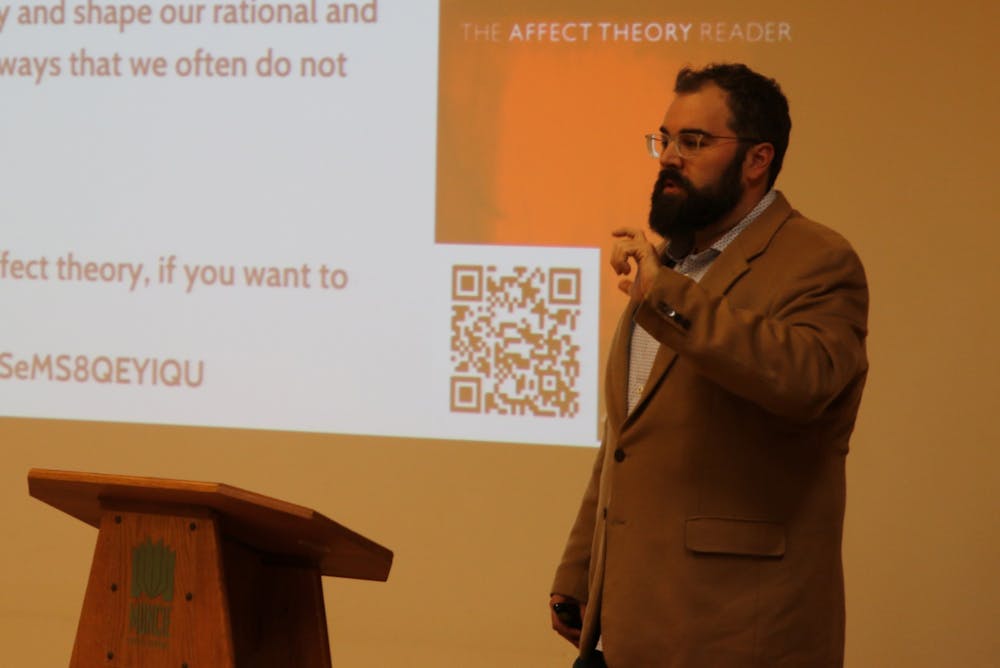Pet ownership as a “Racial Hinge.”
Dogs and Islamophobia in Europe and North America.
These were both topics of discussion from the series “Big Questions, Big Ideas” hosted at the Muncie Public Library Kennedy Branch. The speaker was Dr. Matthew R. Hotham, an assistant professor of religious studies at Ball State University.
Hotham opened up by first talking about what Islamophobia really means.
“Islamophobia implies, just in the structure of it, a fear of Islam, but a better term might be Muslimophobia because usually, people aren’t fearful of the very concept of Islam,” Hotham said. “Better yet, just xenophobia because what they are afraid of is the strangeness or the perceived otherness of Muslims.”
Instead of the term Islamophobia, Hotham suggested the term “Anti-Muslim racism.”
This term highlights the racialized elements of discrimination. It also relates to other forms of systematic oppression. It embodies the religion, that religion is not just an internal choice.
Hotham talked about how trolling culture and social media have targeted Muslims in today’s world, and how the memes and jokes online have a great effect that generalizes a whole culture. Now with a basis of what Anit-Muslim racism is, Hotham described how dogs factor in.
“This is [trolling/memes are] not just confined to the internet, sometimes it leaks out into the real world,” Hotham said. “This sign saying, ‘Please be courteous to your Muslim neighbors,' was posted in Hoffman Park in Pit Meadows, a suburb of Vancouver.”
They essentially read: please leash your dogs, and they are considered “filthy” in Islam.
The signs were posted in the Muncie dog park with logos from the City of Muncie itself. The City did not create them, nor did the local Islamic centers.
“In all likelihood, based on where else these posters have shown up at, these were produced by an online community of Islamophobes hoping to gin-up media controversy and ‘red pill’ the local liberal community,” Hotham said.
Hotham talked about “red pilling” from the movie “The Matrix,” that taking the pill would open up the world around someone. Hotham said, in this case, liberals would “finally see” the Islamic culture how the anti-Muslim groups wanted them to see it.
In reality, most Muslims partake in Wudu, which consists of washing hands, then mouth, nose, face, hair and ears and finally their ankles and feet.
Hotham spoke on how people bring up ancient talks about the possible dealings with dogs and what to do with them in the years of early Islam. In reality, they were talking about rabid dogs and dogs that could possibly cause danger.
There are now two main sides between Muslims that Hotham talked about.
The first being they are Pious tools and fine to have as pets, they are either good dogs or bad dogs, and those good ones are fine to have around. Another belief is that they are not evil, but you do not have to seek out their company.
“Racial Hinge” of animals and Muslims is that human-animal relations can “darken” or “whiten” a person in the eyes of the white western public.
“Pet ownership, or how you relate to certain types of non-human animals, seems to function as a racial hinge,” Hotham said. “If you are a Muslim who is willing to eat pork, drink alcohol and have a dog, you are going to read “whiter” than a Muslim who does not do those things.”
This was not the first “Big Questions, Big Ideas” event, as the program has been going on for 10 years, starting with Jeffrey Fry, a professor of philosophy at Ball State University.
Kennedy Branch adult services specialist, Joe Nelson, also has an integral part in the program.
“‘Big Questions, Big Ideas’ I run as a part of Muncie Public Library Liaison,” Nelson said. “This is a partnership that we do with Ball State’s Department of Philosophy and Religious Studies. We provide the venue for the question and idea so they can come out here and engage with both the Ball State populous per student population, as well as [the] Muncie community population.”
Nelson said the Kennedy Library branch is really a “profound” social center, as it is located off W. McGalliard Road.
“We feel like we have our finger to the pulse of the Muncie community at this particular location, but all of our branches are equally important,” Nelson said.
Contact Elijah Poe with comments at elijah.poe@bsu.edu or on Twitter @ElijahPoe4.





